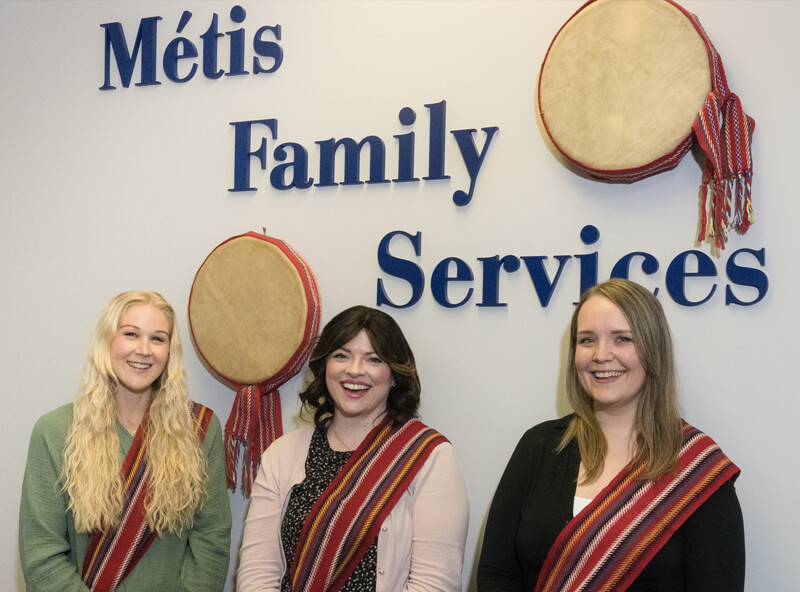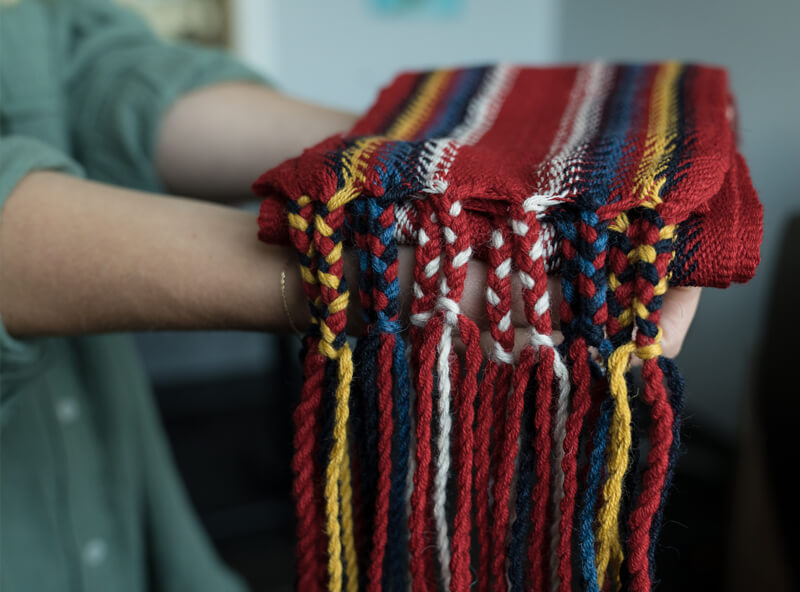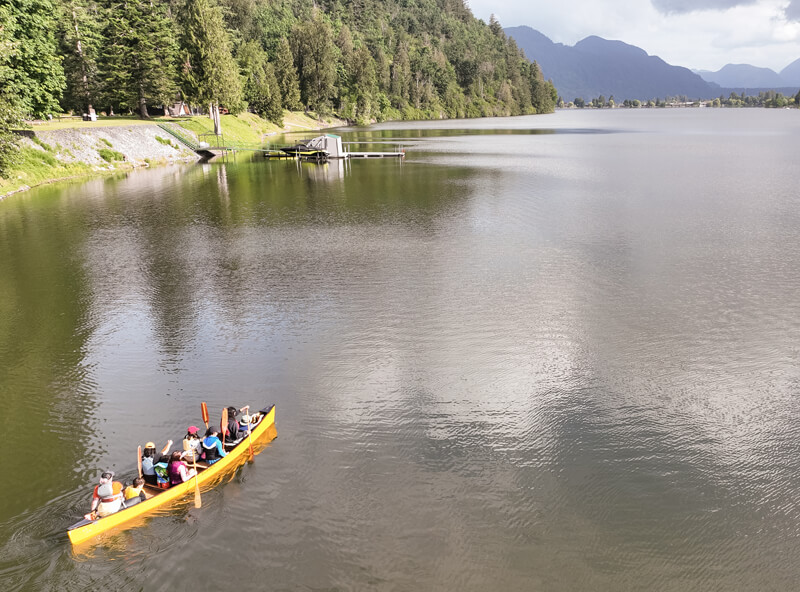If you could be white passing, it’s what you did
Clara Hunter* says that while growing up, her Métis identity was a secret. “If you could be white passing that is what you did. It’s not like today where my kids have pride in who they are.”
Twenty-six years ago, she became Métis Family Services (MFS) very first caregiver (foster parent). She says that it was within the walls of MFS that she strengthened her Métis identity. “It wasn’t until I started fostering, that I was able to work with one of the elders and learn my culture. And I did it side by side with my kids.”
Hunter and her husband have since adopted three Métis children through MFS which offers a first-of-its-kind adoption service for Métis kids in BC.
Not every Métis child can go home, but every Métis child deserves a home.
MFS is one of 24 Indigenous Child and Family Services providers in B.C. The Surrey-based agency provides guardianship, prevention, family strengthening, child protection and a whole range of services to hundreds of mostly urban Métis families.
Executive Director of MFS, Adam Calvert explains that permanency planning is an essential and vital service on the continuum of care for Métis children and youth. “Colonization, and disconnection from homelands, family, and culture are destructive forces we are dealing with. Not every Métis child can go home, but every Métis child deserves a home.”
The concept of permanency or adoption brings a fraught history for Indigenous Peoples, and now, under provincial and federal legislation, it is the option of last rather than first resort for Indigenous children and youth.
There are 20,000 Métis families in MFS’s permanency and adoption catchment area from Boston Bar to Surrey, and it is one of only two Indigenous agencies in B.C. that is authorized to do adoptions.
Over the last seven years, MFS has worked with over 50 children to find places of permanency and adoptions, and they also support the Ministry of Child and Family Development (MCFD) and other Indigenous child and family service agencies to do culturally safe Métis adoptions. The program received additional funding this year from MCFD.

‘Catherine Caldwell is the champion of moving the work for MFS’s Métis permanency and adoption program. “We are always thinking long-term,” explains Caldwell. “When we look at permanency planning, our main goal is having the family drive the ship. This starts with gathering the circle and exhausting all possible family connections- looking at every auntie and granny in this kid’s life and making sure that we’ve spoken with them not just once but multiple times.”
Caldwell and her team spend a lot of time playing detective and tracking down relatives across the country. It’s time consuming and expensive and this year received additional funding to support.
Caldwell explains that if it’s not possible to place the child with their own family, the next step is to pursue a cultural match and find another Indigenous home. Non-Indigenous homes are considered last and always under the guidance of the family.
Family openness is an absolute requirement for all adoptions through MFS. “If we see any resistance from prospective adoptive parents to openness with the birth family that becomes a hard no from us.”
It’s not the tool that’s culturally sensitive, it’s the worker
When asked what makes MFS adoptions different from mainstream adoptions, Caldwell says it’s the emphasis on relationships and culture.
Ceremony is a big differentiating factor in the MFS adoption process. Every child or youth helps to shape their own ceremony which is usually attended by birth family, adoptive family, MFS staff, and other important people in the child’s life.
Hunter agrees. “The paperwork requirements were the same but that’s where the similarities end.”
To adopt in B.C., prospective parents need to complete what’s called a home study to ensure the home is safe and parents are ready. As a caregiver and adoptive parent, Hunter has been through several home studies. She says it’s an invasive process made worse when that person is a stranger.
“They are writing the story of your family, it’s so important they get it right.” she says. “Métis Family Services was the best home study process we had been through and that’s because they have known us and our kids for a long time, have seen us at our best and worse. They are not just social workers. They are people who have bounced my little people on their knee, they are people who have disciplined my kids, kissed their scrapes. They’ve celebrated my kids’ achievements, walked them through ceremony and helped them maintain connections to birth families. They had the right lens to describe our household and the people in it.”

The changing child welfare landscape for Métis kids
Hunter has witnessed big changes over the last 26 years as a caregiver and adoptive parent. She has had a hand in raising more than 27 children and youth, nine of whom are still at home.
Over the past two decades she has seen the benefits of consistency of placement. “It’s critical to children’s wellbeing” explains Hunter, “because it allows kids to settle and relax into being parented.”
She welcomes increases in family placements but recognizes that they aren’t always possible and that the adoption process itself can be traumatic. That’s why, she says it must be attended to with care and ceremony.
“Every Indigenous child in care, she explains “has a history that is rife with loss and a history that predates me.”
When she adopted her daughter Nora*, Hunter was given a rough ride. “Nora’s whole thing was everybody who’s ever claimed to love me and promised me forever, let me down. And she was 100% right. And so, it was not her job to believe me. It was my job to prove that what I said when I said forever, was actually forever.”
“If love and want were enough, all of our parents would get their kids back, every single one of them. And so, the difference for our kids is that they have settled into a family that can acknowledge the journey that they’ve been on. Have the ability to like them and love them for who they are.”
Calvert says that recent amendments to the Child, Family and Community Service Act (CFCSA) are an important first step for improving child welfare, but there is still room for improvement for Métis families.
Reconnecting
Hunter says that foster care is no place for children and youth to grow up. Especially Indigenous children and youth. The 60’s scoop and residential school disrupted excellent parenting that was honed over millennium. “When we first started fostering there was the idea that a foster parent was a better parent,” she says. “There was an automatic idea that no matter what trauma a parent had been through, the answer was foster care. And once a child went into care, it was near impossible for a family to get them back.”
In 2016, she learned that an infant who had come into her care was the daughter of a child that she had provided relief care to more than 19 years earlier. Seeing this cycle of kids-of-kids ending up in care motivated her to aid in the creation of a non-profit dedicated to teaching parents how to parent with an emphasis on family unification and preservation.
Hunter’s non-profit works with MFS and other Indigenous child and family service agencies and has helped over a dozen families reunify/stay together. In this way, her personal and professional world have coalesced around a simple and lifelong mission.
“Our number one job as parents is to help kids to know themselves and love themselves. But if you don’t have the basics of parenting and you haven’t been loved and parented yourself, how are you able to care for the complex needs some of our kids have today? In the past, we would have the help of our kookum and uncle down the road. Now organizations like MFS and the Growing Up Hope Society are stepping in to fill that void.”

*pseudonyms are used in this story to protect the privacy of minor children who are in care.
“Colonization, and disconnection from homelands, family, and culture are destructive forces we are dealing with. Not every Métis child can go home, but every Métis child deserves a home.”
